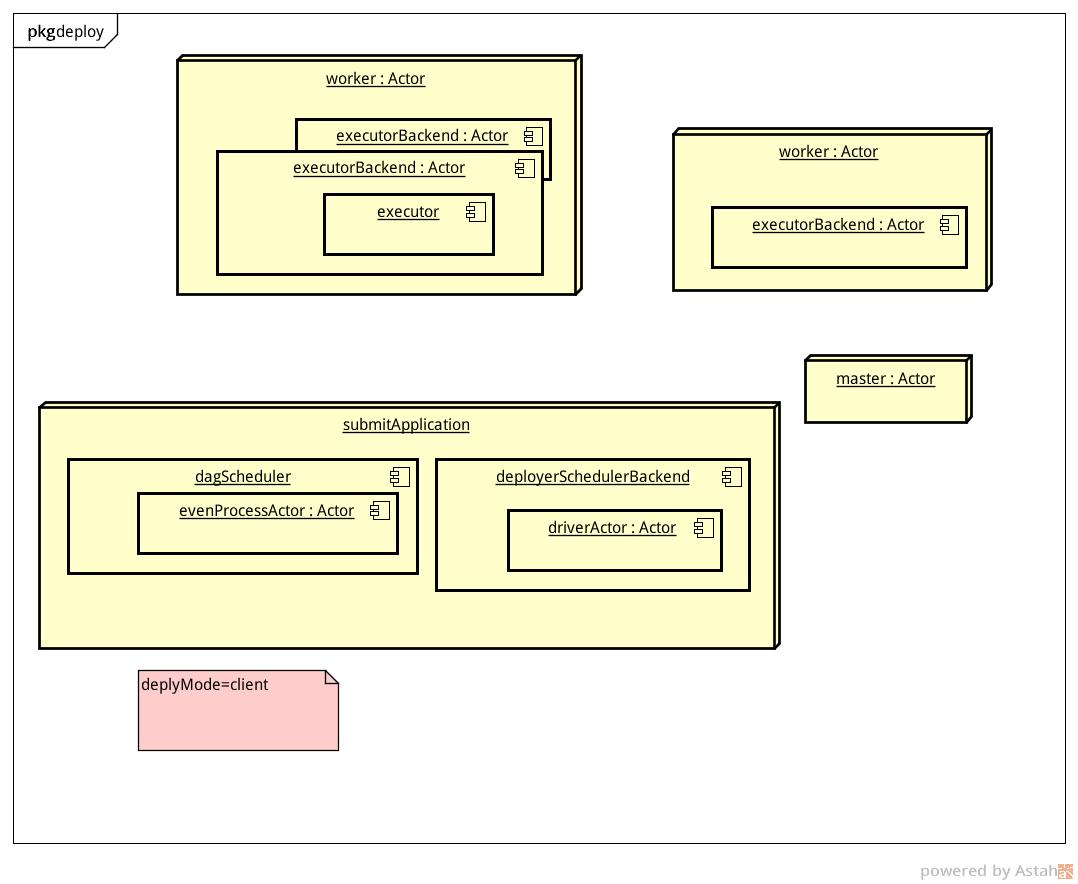Job

script spark-submit => `org.apache.spark.deploy.SparkSubmit'
Job Submit
SparkSubmit, 提交应用到master: 当deploymode=cluster时,SparkSubmit 将应用包装成org.apache.spark.deploy.Client
如果deploymode=client直接启动应该的main class
Client创建启动ClientActor,将应用转换为DriverWrapper,然后通知master
Driver的mainClass是DriverWrapper
private class ClientActor(driverArgs: ClientArguments, conf: SparkConf)
extends Actor with ActorLogReceive with Logging {
override def preStart() = {
masterActor = context.actorSelection(Master.toAkkaUrl(driverArgs.master))
driverArgs.cmd match {
case "launch" =>
val mainClass = "org.apache.spark.deploy.worker.DriverWrapper"
masterActor ! RequestSubmitDriver(driverDescription)
master收到通知后,把driver加到waitingDrivers里面,然后schedule,sechdule则是在waitingDrivers里拿一个选一个Worker launch
private[spark] class Master(
host: String,
port: Int,
webUiPort: Int,
val securityMgr: SecurityManager)
extends Actor with ActorLogReceive with Logging {
override def receiveWithLogging = {
case RequestSubmitDriver(description) => {
logInfo("Driver submitted " + description.command.mainClass)
val driver = createDriver(description)
persistenceEngine.addDriver(driver)
waitingDrivers += driver
drivers.add(driver)
schedule()
}
}
def launchDriver(worker: WorkerInfo, driver: DriverInfo) {
logInfo("Launching driver " + driver.id + " on worker " + worker.id)
worker.addDriver(driver)
driver.worker = Some(worker)
worker.actor ! LaunchDriver(driver.id, driver.desc)
driver.state = DriverState.RUNNING
}
在Worker端收到LaunchDriver消息后 Worker.scala
case LaunchDriver(driverId, driverDesc) => {
logInfo(s"Asked to launch driver $driverId")
val driver = new DriverRunner(conf, driverId, workDir, sparkHome, driverDesc, self, akkaUrl)
drivers(driverId) = driver
driver.start()
}
DriverRunner启动一个线程运行DriverWrapper,DriverWrapper启动应用并创建一个WokerWatcher[?] actor
DriverRunner.scala
private[spark] class DriverRunner(...
def start() = {
new Thread("DriverRunner for " + driverId) {
override def run() {
try {
val builder = CommandUtils.buildProcessBuilder(driverDesc.command, driverDesc.mem,
sparkHome.getAbsolutePath, substituteVariables, Seq(localJarFilename))
launchDriver(builder, driverDir, driverDesc.supervise)
}
catch {
case e: Exception => finalException = Some(e)
}
worker ! DriverStateChanged(driverId, state, finalException)
}
}.start()
}
Job Running
RDD的action方法都会调用 SparkContext的runJob方法,按partition返回结果
/**
* Run a function on a given set of partitions in an RDD and return the results as an array. The
* allowLocal flag specifies whether the scheduler can run the computation on the driver rather
* than shipping it out to the cluster, for short actions like first().
*/
def runJob[T, U: ClassTag](
rdd: RDD[T],
func: (TaskContext, Iterator[T]) => U,
partitions: Seq[Int],
allowLocal: Boolean
): Array[U] = {
val results = new Array[U](partitions.size)
runJob[T, U](rdd, func, partitions, allowLocal, (index, res) => results(index) = res)
results
}
/**
* Run a function on a given set of partitions in an RDD and pass the results to the given
* handler function. This is the main entry point for all actions in Spark. The allowLocal
* flag specifies whether the scheduler can run the computation on the driver rather than
* shipping it out to the cluster, for short actions like first().
*/
def runJob[T, U: ClassTag](
rdd: RDD[T],
func: (TaskContext, Iterator[T]) => U,
partitions: Seq[Int],
allowLocal: Boolean,
resultHandler: (Int, U) => Unit) {
logInfo("Starting job: " + callSite.shortForm)
dagScheduler.runJob(rdd, cleanedFunc, partitions, callSite, allowLocal,
resultHandler, localProperties.get)
}
(index, res) => results(index) = res 意思是对应结果到 index -> result[index]的函数
在waiter.awaitResult等待结果
DAGScheduler
def runJob[T, U: ClassTag](
rdd: RDD[T],
func: (TaskContext, Iterator[T]) => U,
partitions: Seq[Int],
callSite: CallSite,
allowLocal: Boolean,
resultHandler: (Int, U) => Unit,
properties: Properties = null)
{
val start = System.nanoTime
val waiter = submitJob(rdd, func, partitions, callSite, allowLocal, resultHandler, properties)
waiter.awaitResult() match {
case JobSucceeded => {
logInfo("Job %d finished: %s, took %f s".format
(waiter.jobId, callSite.shortForm, (System.nanoTime - start) / 1e9))
}
case JobFailed(exception: Exception) =>
logInfo("Job %d failed: %s, took %f s".format
(waiter.jobId, callSite.shortForm, (System.nanoTime - start) / 1e9))
throw exception
}
}
16/02/15 14:28:27 INFO DAGScheduler: Job 0 finished: saveAsTextFile at WordCount.scala:25, took 3.481700 s
在handleTaskCompletion()里通知任务完成 DAGScheduler
private[scheduler] def handleTaskCompletion(event: CompletionEvent) {
event.reason match {
case Success =>
task match {
case rt: ResultTask[_, _] =>
stage.resultOfJob match {
case Some(job) =>
job.listener.taskSucceeded(rt.outputId, event.result)
private[scheduler] class DAGSchedulerEventProcessActor(dagScheduler: DAGScheduler)
extends Actor with Logging {
case completion @ CompletionEvent(task, reason, _, _, taskInfo, taskMetrics) =>
dagScheduler.handleTaskCompletion(completion)
def taskEnded(
task: Task[_],
reason: TaskEndReason,
result: Any,
accumUpdates: Map[Long, Any],
taskInfo: TaskInfo,
taskMetrics: TaskMetrics) {
eventProcessActor ! CompletionEvent(task, reason, result, accumUpdates, taskInfo, taskMetrics)
}
/**
* Submit a job to the job scheduler and get a JobWaiter object back. The JobWaiter object
* can be used to block until the the job finishes executing or can be used to cancel the job.
*/
def submitJob[T, U](
rdd: RDD[T],
func: (TaskContext, Iterator[T]) => U,
partitions: Seq[Int],
callSite: CallSite,
allowLocal: Boolean,
resultHandler: (Int, U) => Unit,
properties: Properties = null): JobWaiter[U] =
{
// Check to make sure we are not launching a task on a partition that does not exist.
val maxPartitions = rdd.partitions.length
partitions.find(p => p >= maxPartitions || p < 0).foreach { p =>
throw new IllegalArgumentException(
"Attempting to access a non-existent partition: " + p + ". " +
"Total number of partitions: " + maxPartitions)
}
val jobId = nextJobId.getAndIncrement()
if (partitions.size == 0) {
return new JobWaiter[U](this, jobId, 0, resultHandler)
}
assert(partitions.size > 0)
val func2 = func.asInstanceOf[(TaskContext, Iterator[_]) => _]
val waiter = new JobWaiter(this, jobId, partitions.size, resultHandler)
eventProcessActor ! JobSubmitted(
jobId, rdd, func2, partitions.toArray, allowLocal, callSite, waiter, properties)
waiter
}
private[scheduler] class DAGSchedulerEventProcessActor(dagScheduler: DAGScheduler)
extends Actor with Logging {
def receive = {
case JobSubmitted(jobId, rdd, func, partitions, allowLocal, callSite, listener, properties) =>
dagScheduler.handleJobSubmitted(jobId, rdd, func, partitions, allowLocal, callSite,
listener, properties)